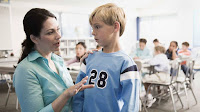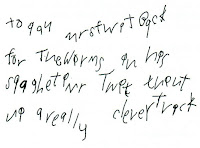“Would there happen to be a sort of ‘tip-sheet’ that I could send my son’s teacher, something concise but informative? He has high-functioning autism, and I get the impression that the teacher views him as just another ‘typical’ student, which I can tell you he’s not! He does perform well in many areas, but in others, he is struggling, and it’s in those areas that he gets accused of have behavior problems, but I think in most cases it’s part of his autistic characteristics.”
Feel free to share the following general points with your son’s teacher, which include classroom strategies specifically for students on the autism spectrum:
 1. Children with High-Functioning Autism (HFA) and Asperger’s dislike change, especially when it’s unexpected. Prepare the child for all changes in routine (e.g., assembly, substitute teacher, rescheduling, etc.). Ideally, use a visual schedule to prepare him for change.
1. Children with High-Functioning Autism (HFA) and Asperger’s dislike change, especially when it’s unexpected. Prepare the child for all changes in routine (e.g., assembly, substitute teacher, rescheduling, etc.). Ideally, use a visual schedule to prepare him for change.
2. Students on the autism spectrum have trouble with organizational skills regardless of their intelligence and age. Even a "straight A" child with HFA who has a photographic memory can constantly forget to bring a pencil to class or to remember a deadline for an assignment. In such cases, assistance should be provided in the least restrictive way possible. Strategies may include having the student put a picture of a pencil on the cover of his notebook or maintaining a list of assignments to be completed at home.
3. Kids on the spectrum seem to have either the neatest or the messiest desks or lockers in the school. The one with the messiest desk will need your help in frequent cleanups of the desk or locker so that he can find things. Please remember that he is probably not making a conscious choice to be messy. He is most likely incapable of this organizational task without specific training.
4. These “special needs” young people have problems with abstract and conceptual thinking. Some may eventually acquire abstract skills, but others never will. When abstract concepts must be used, use visual cues (e.g., drawings or written words) to augment the abstract idea. Avoid asking vague questions (e.g., "Why did you do that?"). Also, avoid asking essay-type questions. Be as concrete as possible in all your interactions with the HFA child.
==> Guide to Teaching Students with Aspergers and High-Functioning Autism
==> Guide to Teaching Students with Aspergers and High-Functioning Autism
5. If your high-functioning student uses repetitive verbal arguments or questions, you should interrupt what can become a continuing, repetitive litany. Continually responding in a logical manner or arguing back seldom stops this behavior. The subject of the argument or question is not always the subject that has upset him. More often, the child is communicating a feeling of loss of control or uncertainty about someone or something in the environment.
Try requesting that he write down the question or argumentative statement. Then write down your reply. This usually begins to calm him down and stops the repetitive activity. If that doesn't work, write down his repetitive question or argument and ask him to write down a logical reply (perhaps one he thinks you would make). This distracts from the escalating verbal aspect of the situation and may give him a more socially acceptable way of expressing frustration or anxiety. Another alternative is role-playing the repetitive argument or question with you taking his part and having him answer you as he thinks you might.
6. If your class involves pairing-off or choosing partners, either draw numbers or use some other arbitrary means of pairing. As an alternative, you could ask an especially kind student if he or she would agree to choose the HFA child as a partner before the pairing takes place. The child on the spectrum is most often the one left with no partner.
7. If the child does not seem to be learning a task, break it down into smaller steps or present the task in several ways (e.g., visually, verbally, and physically).
8. Do not take misbehavior personally. The HFA student is not usually a manipulative, scheming child who is trying to make life difficult for teachers. Most often, misbehavior is the result of efforts to survive experiences that may be confusing, disorienting or scary. Kids on the spectrum are, by virtue of their disability, egocentric. Also, most of them have extreme difficulty reading the reactions of others.
9. Be aware that normal levels of auditory and visual input can be perceived by the HFA student as too much or too little (e.g., the hum of florescent lighting may be extremely distracting). Consider environmental changes (e.g., removing visual clutter from the room, seating changes if the child seems distracted, etc.).
10. Avoid verbal overload. Be clear. Use shorter sentences if you perceive that the child does not fully understanding you. Although he probably has no hearing problem and may be paying attention, he may have difficulty understanding your main point and identifying important information.
More resources for parents of children and teens with High-Functioning Autism and Asperger's:
==> How To Prevent Meltdowns and Tantrums In Children With High-Functioning Autism and Asperger's
==> Parenting System that Significantly Reduces Defiant Behavior in Teens with Aspergers and High-Functioning Autism
==> Launching Adult Children with Asperger's and High-Functioning Autism: Guide for Parents Who Want to Promote Self-Reliance
==> Teaching Social Skills and Emotion Management to Children and Teens with Asperger's and High-Functioning Autism
==> Parenting Children and Teens with High-Functioning Autism: Comprehensive Handbook
==> Unraveling The Mystery Behind Asperger's and High-Functioning Autism: Audio Book
==> Highly Effective Research-Based Parenting Strategies for Children with Asperger's and High-Functioning Autism
==> Parenting System that Significantly Reduces Defiant Behavior in Teens with Aspergers and High-Functioning Autism
==> Launching Adult Children with Asperger's and High-Functioning Autism: Guide for Parents Who Want to Promote Self-Reliance
==> Teaching Social Skills and Emotion Management to Children and Teens with Asperger's and High-Functioning Autism
==> Parenting Children and Teens with High-Functioning Autism: Comprehensive Handbook
==> Unraveling The Mystery Behind Asperger's and High-Functioning Autism: Audio Book
==> Highly Effective Research-Based Parenting Strategies for Children with Asperger's and High-Functioning Autism
11. Uneven skills-development is a hallmark of HFA. Assume nothing when assessing skills (e.g., the student may be a math whiz in Algebra, but not able to make simple change at a cash register; he may have an incredible memory about books he has read, speeches he has heard, or sports statistics, but still may not be able to remember to bring a pencil to class).
12. An increase in unusual or difficult behaviors probably indicates an increase in anxiety for the HFA student. Sometimes anxiety is caused by feeling a loss of control. Many times, the stress will only be alleviated when the child physically removes himself from the stressful event or situation. If this occurs, a program can be set up to assist the student in re-entering and/or staying in the stressful situation. When this occurs, a "safe-place" or "safe-person" may come in handy.
13. Use and interpret speech literally. Until you know the capabilities of the HFA child, try to avoid the following:
- sarcasm (e.g., saying, "Great!" after he has just spilled a bottle of ketchup on the table)
- nicknames
- idioms (e.g., ‘save your breath’, ‘jump the gun’, ‘second thoughts’)
- double meanings (most jokes have double meanings)
- "cute" names (e.g., Pal, Buddy, Wise Guy)
14. Since children on the autism spectrum experience various communication difficulties, it’s best not to rely on them to relay important messages to their parents about school events, assignments, school rules, etc. (unless you try it on an experimental basis with follow-up or you are already certain that the HFA student has mastered this skill).
Even sending home a note for his mom or dad may not work. The child may not remember to deliver the note, or may lose it before reaching home. Phone calls to the parent work best until the skill can be developed. Frequent and accurate communication between the teacher and parent is very important.
Even sending home a note for his mom or dad may not work. The child may not remember to deliver the note, or may lose it before reaching home. Phone calls to the parent work best until the skill can be developed. Frequent and accurate communication between the teacher and parent is very important.
==> Guide to Teaching Students with Aspergers and High-Functioning Autism









